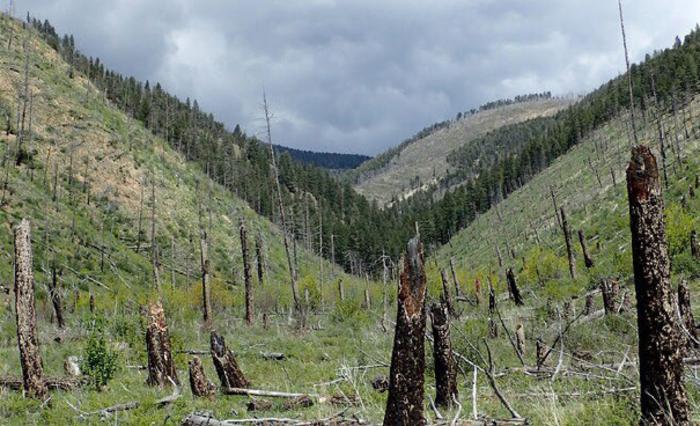The Ecological Society of America (ESA) presents a roundup of four research articles recently published across its six esteemed journals. Widely recognized for fostering innovation and advancing ecological knowledge, ESA’s journals consistently feature illuminating and impactful studies. This compilation of papers explores fire hazards in Mediterranean cork oak woodlands, putting theory to work predicting where cold-blooded organisms will occur under climate change, barriers to going high-tech in rangeland management and more, showcasing the Society’s commitment to promoting cutting-edge research that furthers our understanding of the natural world.

Credit: KT Davis
The Ecological Society of America (ESA) presents a roundup of four research articles recently published across its six esteemed journals. Widely recognized for fostering innovation and advancing ecological knowledge, ESA’s journals consistently feature illuminating and impactful studies. This compilation of papers explores fire hazards in Mediterranean cork oak woodlands, putting theory to work predicting where cold-blooded organisms will occur under climate change, barriers to going high-tech in rangeland management and more, showcasing the Society’s commitment to promoting cutting-edge research that furthers our understanding of the natural world.
From Ecological Applications:
Browsers put a cork in Mediterranean woodland fire risk
Author contact: Miguel N. Bugalho (migbugalho@isa.ulisboa.pt)
Mediterranean oak woodlands are the original home of the world’s cork trees, but they are increasingly threatened by shrub encroachment and intense fires. At the same time, deer numbers have been on the rise throughout the Iberian Peninsula primarily due to land abandonment and an absence of predators. Focusing on the ways in which interactions among drought, shrub encroachment and deer impact Portuguese woodlands, the authors found that deer can reduce the risk of fire in these unique ecosystems. By browsing on encroaching shrubs, deer kept shrub expansion in check, which reduced fuel loads and lessened fire hazards. After 18 years, woodland plots that were fenced to keep deer out had denser thickets of shrubs—more fuel for fire—than neighboring unfenced plots where deer were free to browse. Based on these results, the authors conclude that control of understory vegetation by deer and other browsers can play an important role in shielding Mediterranean woodlands from intensifying fire conditions as the world warms.
Read the article: Ungulates mitigate the effects of drought and shrub encroachment on the fire hazard of Mediterranean oak woodlands
From Ecology:
Novel framework predicts where species will occur under climate change
Author contact: Margaret W. Simon (mwsimon@ku.edu)
Move over, birds and mammals—most animals on Earth, including nearly all pests and pathogens, are cold-blooded and unable to internally regulate their body temperature. Climate change is expected to directly impact where these species live, how many there are, and which new pests or diseases invade. To predict these impacts, this study examines how temperature affects different traits of cold-blooded animals and how these traits, in turn, influence their populations. By creating a model that considers how traits like growth rate and reproduction respond to temperature changes, the research team can predict where species can survive as temperatures shift. The model is general enough to work for many types of cold-blooded animals, from insects to fish to reptiles, and can even apply to conditions other than temperature, like humidity or salinity. By understanding these temperature effects, we can better anticipate how climate change will affect ecosystems, including which species might thrive or struggle in new conditions.
Read the article: Predicting the fundamental thermal niche of ectotherms
From Frontiers in Ecology and the Environment:
Wider use of technology would aid rangeland management
Author contact: Brandon T. Bestelmeyer (brandon.bestelmeyer@usda.gov)
With accelerating development of new digital tools like monitoring databases, online maps, virtual fencing, mobile applications and more, land management is going high-tech—or, at least, it has the potential to do so. For managers of the world’s rangelands, numerous web-based instruments have been introduced in recent years that could significantly improve, if not revolutionize, development of effective management and response strategies. But what good are these marvels of the modern age if rangeland managers can’t access, are unfamiliar with or have little confidence in such tools? The authors of this article contend that social networks of managers, scientists and technology experts will be crucial if rangeland management is to keep pace with technological innovation and adapt to a changing world.
Read the article: Fulfilling the promise of digital tools to build rangeland resilience
Tips for managing landscapes reshaped by wildfire
Author contact: Kimberley T. Davis (kimberley.davis@usda.gov)
Natural landscapes have historically been shaped by wildfire, but changing climate conditions are driving rapid shifts in how often and how intensely fires burn. These changing fire regimes can trigger large-scale changes in many ecosystems. Post-fire transitions from forest to scrubland, or from native sagebrush to invasive grasslands, have been well documented throughout the western U.S. However, the authors of this study argue that too little of this research has focused on whether conventional management approaches can meet the complex challenges posed by these altered ecosystems. They advocate for greater collaboration among managers, scientists and Indigenous communities, along with additional pre- and post-fire research, expanded monitoring and greater exchange of information among stakeholders.
Read the article: Centering sociological connections to collaboratively manage post-fire vegetation shifts
###
The Ecological Society of America, founded in 1915, is the world’s largest community of professional ecologists and a trusted source of ecological knowledge, committed to advancing the understanding of life on Earth. The 8,000 member Society publishes six journals and a membership bulletin and broadly shares ecological information through policy, media outreach and education initiatives. The Society’s Annual Meeting attracts 4,000 attendees and features the most recent advances in ecological science. Visit the ESA website at
Follow ESA on social media:
Twitter/X – @esa_org
Instagram – @ecologicalsociety
Facebook – @esa.org



